Key Takeaways:
- 23 million households in the U.S. get water from private wells.
- Well water is more likely to be hard water.
- Well water softener systems reduce water hardness from well water by removing heavy minerals, including calcium and magnesium, primarily using an ion exchange process.
- Tyent’s “Soft Water Buddy” softens water, and when paired with a Tyent ionizer, it also purifies the water—an essential combination, as 23% of private wells contain contaminants at harmful levels.
If you’re living in one of 23 million U.S. households that rely on water from private wells, you know that maintaining the safety and quality of your water is on your shoulders. You also likely know that your water is more likely to be hard, thanks to the organic matter your water touches.
Hard water can wreak havoc on your digestive system, trigger skin conditions like eczema, turn your hair brittle, and damage your household appliances. Thankfully, well water softener systems can help.
In this article, we cover how well water softener systems work, the best options on the market, and how to choose the right one for your home.
What Are Well Water Softener Systems?
Well water softener systems are devices designed to remove minerals like calcium and magnesium that cause water hardness. These systems typically use a process called ion exchange to produce softer water that is gentler on pipes, appliances, and skin, and improves the effectiveness of soaps and detergents.
How Do Well Water Softener Systems Work?
Well water softener systems primarily rely on the process of ion exchange. In this process, water passes through a tank with a bed of resin beads that contain sodium. When the water reaches these beads, any calcium and magnesium ions in the water exchange with the sodium ions. Those sodium ions enter the water, and soft water exits the system for household use.
Best Well Water Softener Systems
If you’re concerned about hard water in your well water, these well water softener systems can help:
1. Tyent “Soft Water Buddy” – Remineralization Filter
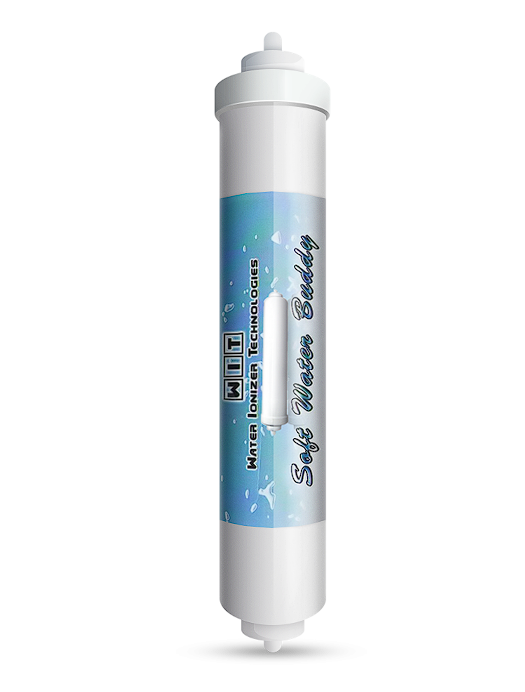
The Tyent “Soft Water Buddy” is a water softener pre-filter that’s the perfect addition to your well water softener system. This filter helps soften the water, but it also remineralizes the water with an efficient mix of 50 percent Calcite and 50 percent Corosex. The result? Healthy, nourishing, hydrating water, as well as scale reduction and added protection for your soft water system.
Looking for the perfect well water softener system? Pair the “Soft Water Buddy” with a Tyent ionizer. Tyent ionizers remove over 200 contaminants and deliver added benefits like the highest levels of molecular hydrogen available in any ionizer. Together, this duo provides soft water along with the advantages of hydrogen-rich and alkaline water.
Pros:
- Remineralizes water mineral-depleted water
- Reduces corrosion by neutralizing low pH or acidic water
- Easily installed
- Easy maintenance
- Betters the performance of your soft water system
- Tyent has dozens of premium certifications
- Tyent shares third-party lab results publicly
- 100% full lifetime warranty with zero stipulations that covers both parts and labor
- Tyent offers a generous 75-day trial period with a less than 1% return rate
- Accredited with the Better Business Bureau (BBB) for excellent customer service and support, A+ rating
Cons:
- Can take 5-7 days to arrive
- Business hours are Monday through Friday, 9am to 6pm EST
Pricing: $54.95
Add a “Soft Water Buddy” to your well water softener system.
2. Springwell Salt Based Water Softener System SS1
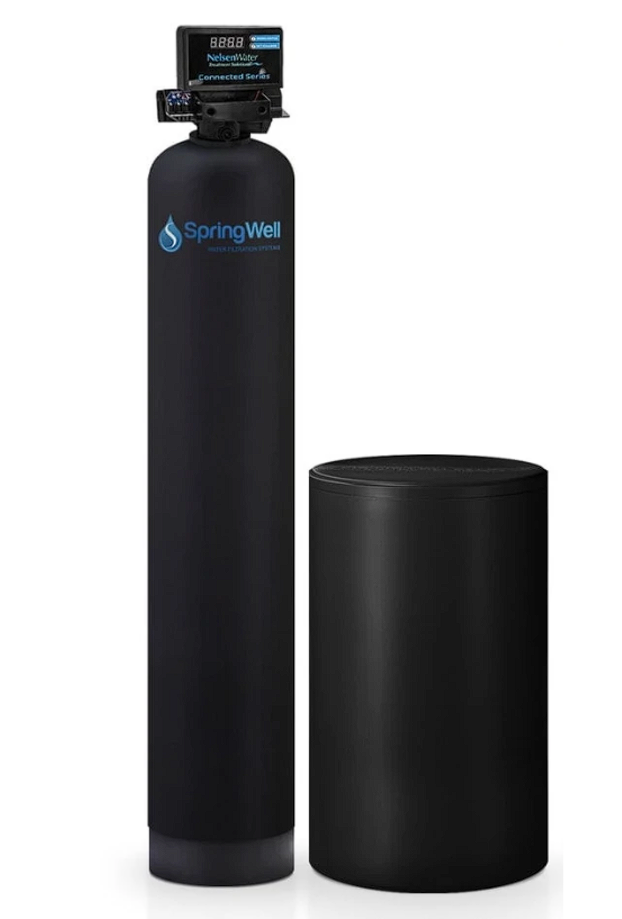
The SpringWell Salt Based Water Softener System SS1 is a whole-house, ion exchange water softener system. It uses an electronic metered valve to measure water by the gallon and determine when to start the cleaning cycle and replenish the sodium in the resin beads.
Pros:
- Works for homes with up to three bathrooms
- Works up to 32,000 grains of hardness
- 11 gallons per minute (GPM) standard flow rate
- 1-inch connectors
- 25 to 80 PSI operating pressure
- 36 to 120 degrees Fahrenheit operating temperature
- 6.5 to 10 pH range
- Bluetooth-enabled control head
Cons:
- Flo Smart Water Monitor & Shutoff, which offers leak protection, comes at an additional cost
- This system does not filter other contaminants, and filtration and purification system options come at an additional cost
- Complicated, limited warranty
- Poor customer service
Pricing: $1,478
3. Aquasana SimplySoft 40,000 Grain Softener – WH-SF40

The Aquasana SimplySoft 40,000 Grain Softener is a whole-house water softener that relies on the ion exchange process to remove hard water minerals. This system includes a sediment pre-filter and an LCD control head,
Pros:
- For homes with up to five people and four bathrooms
- Works on up to 40,000 grains of hardness
- 15.5 GPM peak flow rate
- 200 grains per gallon (GPG) max hardness
- 230 pounds of salt storage
- 40 to 100 degrees Fahrenheit operating temperature
- 125 PSI max operating pressure
Cons:
- Installation kit and additional pre-filters come at an additional cost
- Limited warranty
- Poor customer service
- Reviewers mention frequent leaks
Pricing: $799
4. GE 30,000 Grain Water Softener – GXSF30V
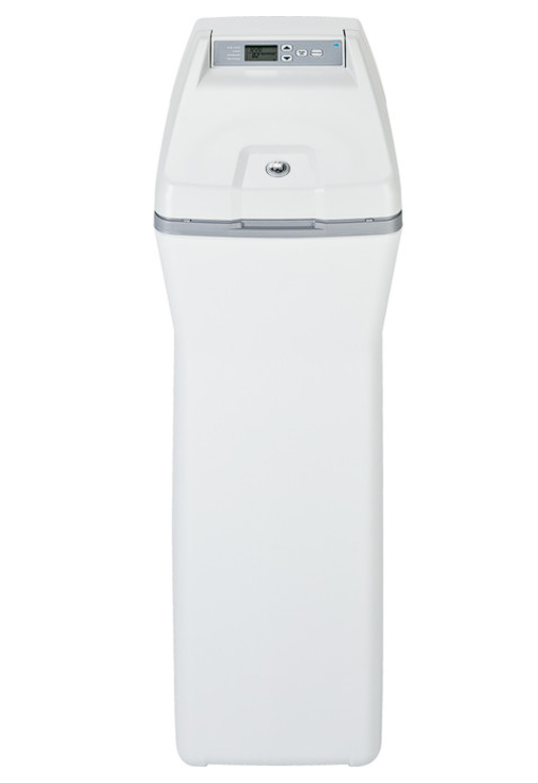
The GE 30,000 Grain Water Softener is a salt-based water softener. It features up-front electronic controls along with status light indicators that show when users have to refill the salt tank.
Pros:
- Works up to 30,400 grains of hardness
- 95 GPG max hardness
- Removes up to 8 PPM of iron
- 1-inch connectors
Cons:
- Limited warranty, with users saying the GE doesn’t always honor it
- Doesn’t include sediment pre-filters
- Reviewers mention frequent leaks and the product not lasting long
Pricing: $499
5. iSpring WCS45KG Whole House Water Softener
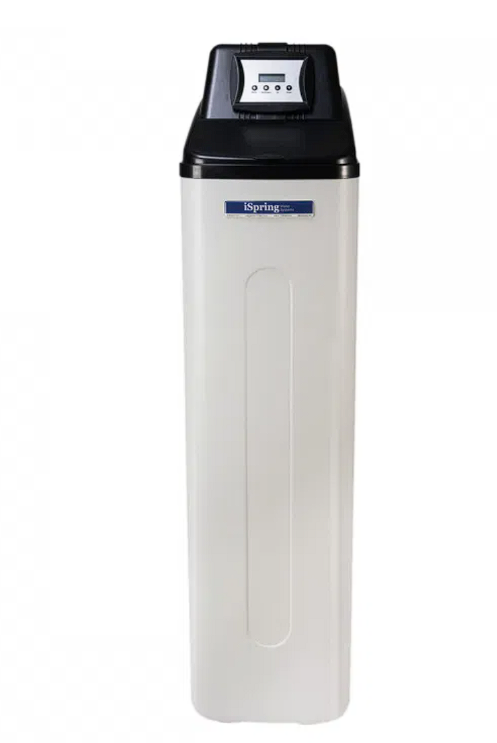
The iSpring WCS45KG Whole House Water Softener is a salt-based water softener. It includes an automatic backwash and media regeneration feature and an automatic control valve.
Pros:
- Works up to 45,000 grains of hardness
- 26 GPM max flow rate
- 94 GPG max hardness
- 1-inch connectors
- 21 to 64 PSI operating pressure
- 40 to 100 degrees Fahrenheit operating temperature
Cons:
- Limited manufacturer warranty unless paying for additional warranty
- Does not include a sediment pre-filter
- Does not filter iron, and it’s recommended to add an iron filter before using this product
- Poor customer service
Pricing: $905.26
6. AquaSure Harmony Series 48,000 Grains Water Softener AS-HS48D
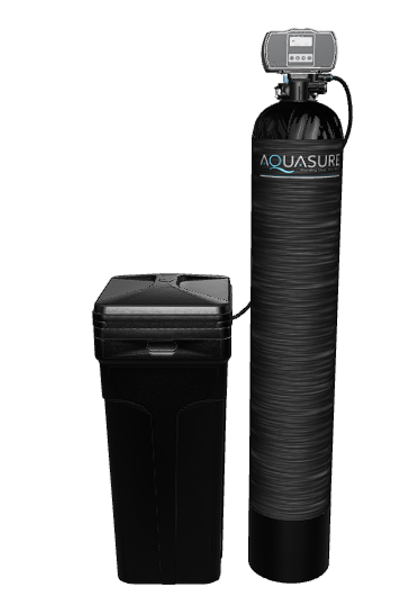
The AquaSure Harmony Series 48,000 Grains Water Softener AS-HS48D is a salt-based whole-house water softener. It has an autmatic digital control head and automatic metered backwashing and regeneration features.
Pros:
- Works for homes with up to five people and four bathrooms
- Works on up to 48,000 grains of hardness
- 110 GPG max hardness
- 15 GPM max flow rate
- 160-pound salt capacity
Cons:
- Does not remove iron, PFAs, or other chemicals
- Does not include a sediment pre-filter
- Reviewers mention frequent leaks
- Poor customer service
- Complex, limited warranty
Pricing: $579.99
7. APEC FUTURA-15 Salt-Free Anti-Scale Water Conditioner
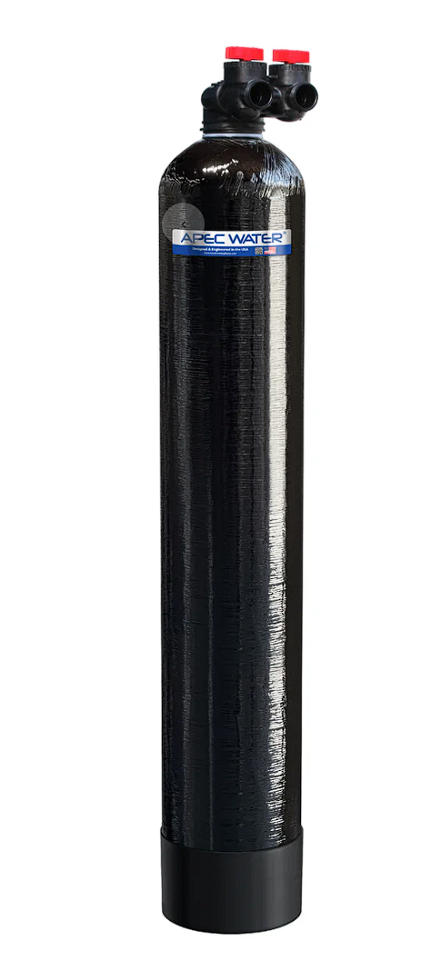
The APEC FUTURA-15 Salt-Free Anti-Scale Water Conditioner does not use salt, so it’s not a water softener. It’s a water conditioner and does not remove hard water minerals. Instead, hard water minerals attach to ceramic media granules and are converted to a crystalline form that resists scale.
Pros:
- Works for homes with up to six bathrooms
- 25 GPG max hardness
- 15 GPM flow rate
Cons:
- Does not remove hard water minerals
- Limited warranty, with additional warranty purchase options
- Adding an additional iron filter is recommended for well water
- Poor customer service
- Users mention hard water stains
Pricing: $1,199.95
How to Choose a Well Water Softener System
Softening your well water starts with finding the right well water softener system. What should you consider before investing in your own system?
Test Water Quality
The Environmental Protection Agency (EPA) recommends testing your water yearly to maintain a record of quality. Testing your water at home is essential for those using well water, as you alone are responsible for ensuring it’s safe.
Not sure where to start? Tyent offers free water reports for every major municipality in the United States.
Choose the Right Type of System
The two primary ways to combat hard water are water softeners and water conditioners. Water softeners can reduce hard water minerals, while water conditioners only mitigate the effects of hard water.
You should also look for well water softener systems that have additional capacities for filtration, as 23% of private wells in the U.S. have at least one pollutant at a level posing potential health concerns. Using a Tyent ionizer and a “Soft Water Buddy” is a great way to get the filtration and water softening you need to keep your well water clean and healthy.
Consider Flow Rate and Capacity
Water softeners affect flow rate, and their ability to handle hardness varies. In areas with particularly hard water, choose a unit with higher hardness capacity. For salt-based softeners, consider salt capacity, as lower capacity means more frequent refills. The right balance ensures your softener meets your needs.
Factor in Maintenance and Costs
When choosing a water softener, consider the cost of replenishing salt and replacing additional filters over time. Check the warranty as well—some companies don’t cover parts and labor for maintenance. Tyent stands out with a 100% full lifetime warranty, covering both parts and labor with no stipulations.
Learn More about Well Water Softener Systems
Let’s take a look at some of the most commonly asked questions about well water softener systems:
What type of water softener is best for well water?
The U.S. Department of Energy recommends using a salt-based, dual-tank water softener with two resin tanks, as it has the best ability to filter heavy minerals common in well water. No matter what type of water softener or conditioner you use, consider adding a “Soft Water Buddy” for enhanced filtration.
How much is a water softener for a well system?
Water softeners for well systems can range greatly in price. While the Tyent “Soft Water Buddy” is only $54.95, other water softener systems can cost thousands of dollars.
What is the best system for well water?
Because well water can potentially be contaminated with many chemicals and pollutants, you should consider investing in a system that includes not only a water softener but also filtration technology. Using a Tyent ionizer with a “Soft Water Buddy” allows you to rid your water of more than 200 contaminants while also providing the benefits of soft water, hydrogen water, and alkaline water.
How long does a water softener last on well water?
Water softeners can last between 15 and 25 years. However, the lifespan of your water softener depends on the unit’s maintenance.
Choose the Best Well Water Softener System
Well water is often hard water, absorbing minerals from the ground around it, and using a well water softener system can help. However, not all water softeners work the same way, and not all are also capable of removing the additional contaminants that can be found in well water.
Using a Tyent ionizer and a “Soft Water Buddy” can provide softer water while removing more than 200 pollutants from your water source. Tyent ionizers provide alkaline water with the most molecular hydrogen of any ionizer on the market at the touch of a button.
Get started with a Tyent ionizer and a “Soft Water Buddy” and start getting cleaner, softer well water.
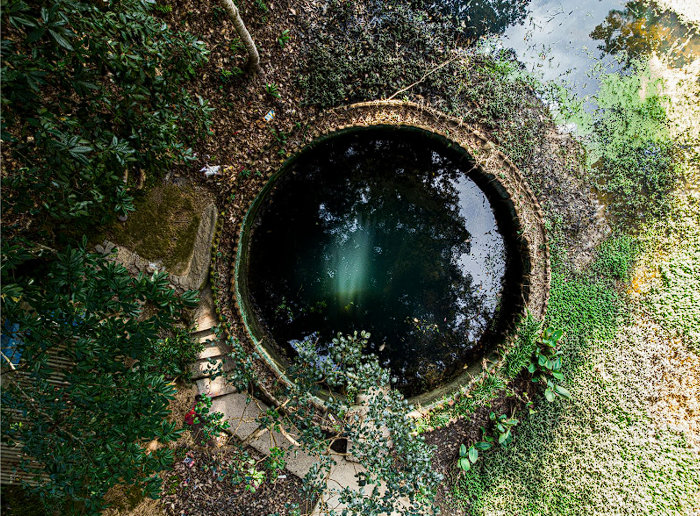
![8+ Best Water Softener Filters [2024] Screenshot 2024-12-02 214550](https://www.tyentusa.com/blog/wp-content/uploads/2024/12/Screenshot-2024-12-02-214550-150x150.png)
![11+ Best Well Water Filters [2025] Screenshot 2024-12-20 113221](https://www.tyentusa.com/blog/wp-content/uploads/2024/12/Screenshot-2024-12-20-113221-150x150.png)
![11+ Best Soft Water Systems [2025] Screenshot 2024-12-02 205230](https://www.tyentusa.com/blog/wp-content/uploads/2024/12/Screenshot-2024-12-02-205230-150x150.png)
